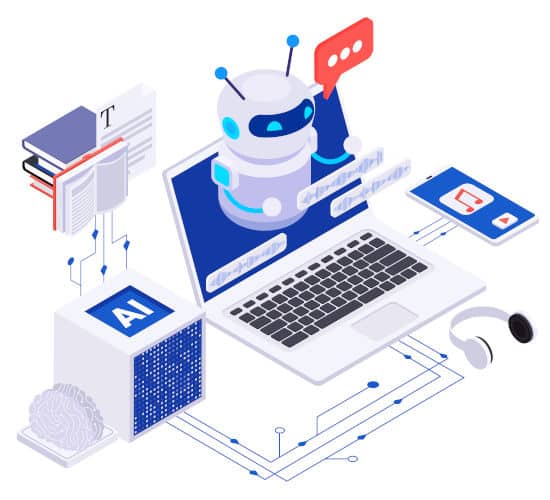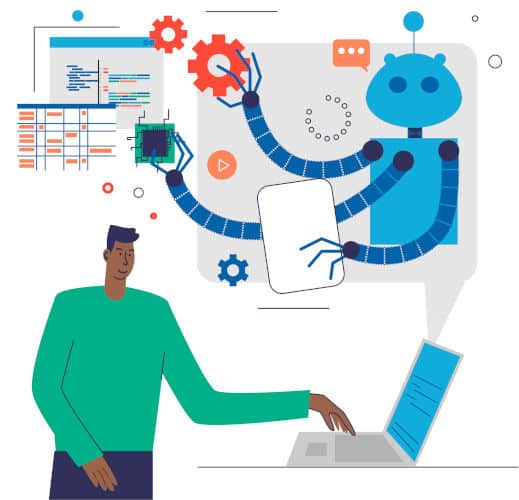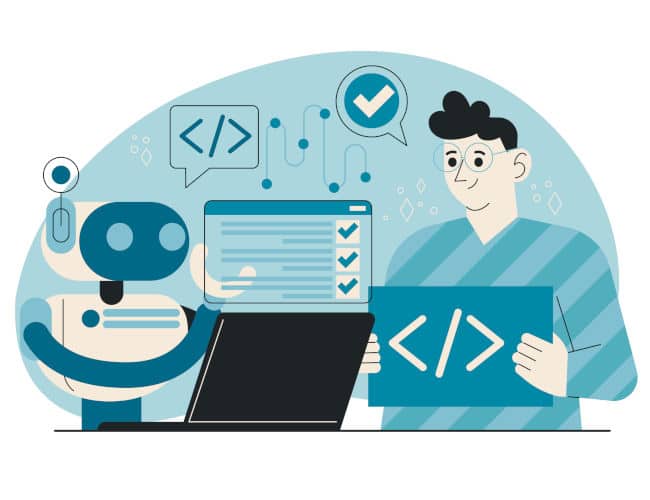With the rise of artificial intelligence, AI developers are increasingly sought after by companies. Find out everything you need to know about this profession, the skills required, and how to acquire them through training!
In recent years, artificial intelligence has emerged as a major technological revolution, reshaping the way we understand the world and solve complex problems.
Generative AI tools such as ChatGPT and Google Bard have completely revolutionised businesses and the field of art and culture. It’s a real leap forward in productivity and creativity, made possible by automation.
Against this backdrop, businesses are looking for digital architects with the skills needed to translate the abstract concepts of AI into concrete applications: AI developers!
Back to basics: what is artificial intelligence?
Before looking at this fast-growing profession, it is important to understand the origins of AI and how it has evolved. Far from being a mere fad, this technology has deep roots in the history of computing.
The concept was born in the middle of the 20th century, and has undergone immense progress fuelled by advances in computer science, mathematics and computing capacity.
The first programmes were barely capable of solving simple logical problems, but AI has developed with fields such as Machine Learning and Deep Learning.
This has paved the way for many practical applications, from speech recognition to computer vision. Little by little, the way in which machines interact with the world around them has been redefined.
Today, AI takes many forms, from recommendation systems and autonomous cars to chatbots and image generators.
It has found its way into a wide variety of sectors, revolutionising the healthcare, finance, logistics and other industries. So, in this context, what is the role of the AI developer?

What is an AI developer and what is their role?
As a specialist software engineer, the AI developer focuses on the creation and deployment of AI systems and solutions. They may work on language processing algorithms, computer vision or even robotics.
Their tasks include collecting and pre-processing data, while ensuring data quality: an imperative for the success of an AI project. Developers have to collect, clean and pre-process the data so that it is representative and suited to the target objective.
Depending on the nature of the problem, this expert chooses the most appropriate type of AI model and configures it. These may be neural networks or decision trees, for example.
The next step is to train the model using the training data. The developer must monitor the process carefully and adjust the parameters to optimise the model’s performance.
Once the model has been trained, it needs to be evaluated on test data to ensure that it is robust and can be generalised to new situations.
To complete the development process, the AI model needs to be integrated into the existing infrastructure and deployed for practical use. This requires close collaboration with the operational teams.
Over time, the professional constantly refines the AI algorithms for optimum performance. They also need to keep abreast of developments in AI technologies and methods to ensure that they remain up to date.
What skills do you need?
As the architect of AI systems, the AI developer must possess a varied set of technical skills that make up their toolbox for solving a wide variety of problems.
They master programming languages such as Python, R and Java, offering the flexibility and efficiency that are essential for developing machine learning and deep learning algorithms.
Furthermore, understanding Machine Learning algorithms is the key to success in this field. The expert must be familiar with both classic techniques and the latest advances, in order to navigate this constantly evolving landscape.
Data being the fuel of AI, the developer must also be capable of handling large quantities of information. They need skills in Big Data processing, data cleansing and feature extraction. This is what enables them to guarantee the quality of the models.
Development frameworks also make it easier to build, train and deploy AI models. Examples include TensorFlow, PyTorch and scikit-learn.

But that’s not enough, because AI is often faced with complex and ill-defined problems. To solve them, developers need to combine logic, creativity and perseverance!
Salary: what can you expect to earn as an AI developer?
AI developers are generally highly paid, and the salaries offered by companies are likely to continue to rise over the coming years.
In France, according to Talent.com, the average salary is in excess of €52,000 a year. This compares with €60,000 in Germany according to GermanTechJobs and £55,000 in the UK according to DevIT.
However, the big countries are not always where the best salaries are to be found. According to TalentUp, the average is €70,000 in the Netherlands, and €65,000 in Sweden and Austria.
Of course, incomes are much higher in the United States, but the cost of living is not the same. According to sources such as Glassdoor and ZipRecruiter, an American AI developer can earn more than $150,000 a year.
A challenging profession
The day-to-day life of an AI developer is far from a smooth ride. Despite the many opportunities offered by this technology, this professional faces complex challenges throughout his or her career.
Artificial intelligence tasks can be extremely complex, requiring an in-depth understanding of specific areas of application. The expert must be prepared to solve ill-defined problems and devise innovative solutions.
In addition, AI raises important ethical issues ranging from the transparency of algorithms to the fairness of models.
It is the role of the developer to ensure that they create solutions that are fair, impartial and respect fundamental rights.
It’s also a fast-moving field, with new methods and technologies emerging all the time. That’s why specialists need to stay constantly informed and keep their skills up to date.
They also need to know how to work as part of a team, collaborating with other developers, business experts, data scientists and many other professionals. Communication skills and the ability to work in this interdisciplinary context are therefore essential.

Conclusion: AI developer, the conductor of the artificial intelligence era
With artificial intelligence becoming increasingly ubiquitous, the future for AI developers looks bright. These experts will be able to take advantage of a wide range of career opportunities, and will enjoy an ever-growing influence.
They will be increasingly sought after by companies, and we can expect salaries to rise accordingly. Even now, it is possible to specialise in a specific area, such as creating cross-functional solutions.
The advantage of artificial intelligence is that it is used in virtually every industry, and the developer can be a key player in the digital transformation of these sectors.
To become an AI developer, you can choose DataScientest! Our one- to two-year sandwich course will teach you how to develop and deploy an artificial intelligence solution, or how to design and manage a project.
During the course, you’ll become an expert in Python programming, databases, machine learning and deep learning, Big Data, DataOps and ModelOps. You’ll also learn how to use the cloud from our partner AWS.
At the end of the course, you’ll be awarded AWS Solutions Architect certification and will be able to obtain the “Project Manager in Artificial Intelligence” diploma at Master’s degree level.
What’s more, you’ll have no trouble finding a host company from our extensive network of partners, including prestigious brands such as Toyota, Engie, Orange, SNCF, Thales and Safran.
This distance learning course can be taken under an apprenticeship or professionalisation contract, and the cost can be fully covered by your company. Find out more about DataScientest!










